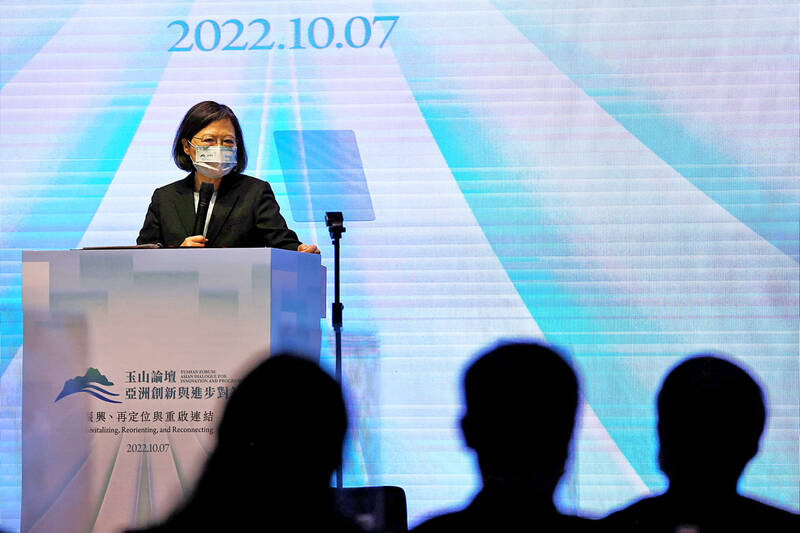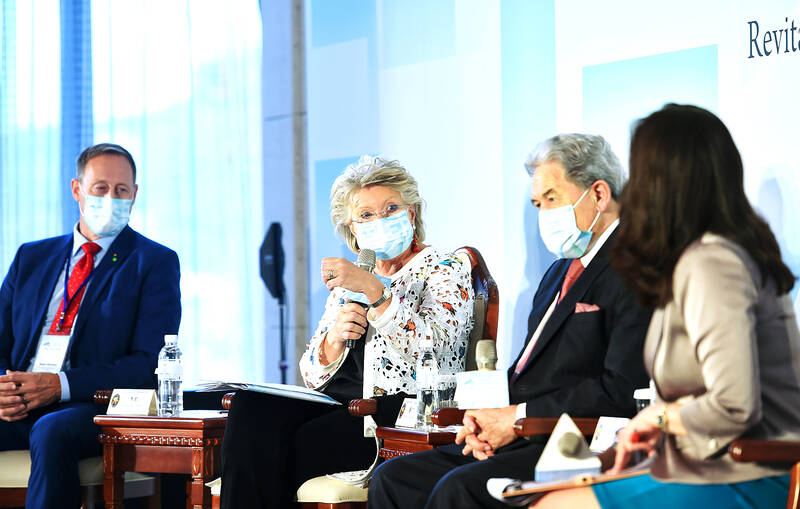Taiwan is looking to play a “crucial” role in the development of the Indo-Pacific region in the post-COVID-19 era, President Tsai Ing-wen (蔡英文) said yesterday at the opening of the two-day Yushan Forum in Taipei.
Taiwan can be “a crucial actor” by assisting in regional and global economic recovery, and contributing to efforts to restructure supply chains, Tsai said.
“While Taiwan stands on the front line of authoritarian expansion, our resilient economy and industrial supply chain remain a vital part of the regional ecosystem,” she said.

Photo: Ann Wang, REUTERS
Tsai pledged to place more emphasis on the government’s New Southbound Policy, an initiative her administration launched in 2016 aimed at expanding economic, cultural and political ties with Southeast Asia, South Asia, Australia and New Zealand.
The policy is to be Taiwan’s “pivotal regional policy for Asia” as it works to “bolster our security and economic ties with partners across the region,” Tsai said.
The government would integrate Taiwan’s capacity in high-tech industries with the policy to promote “a digital New Southbound initiative,” she said.

Photo: Fang Pin-chao, Taipei Times
Taiwan’s enterprises have significantly increased their investment in the 18 countries included in the policy over the past six years, with investment from Taiwan in those countries reaching US$2.2 billion from January to July, Tsai said.
In the first quarter of this year, profits from investments in those 18 countries by listed Taiwanese companies surpassed profits from investment in China by the same companies for the first time, she said.
Former Japanese prime minister Taro Aso said in pre-recorded remarks that he felt a sense of responsibility to further strengthen the relationship between Taiwan and Japan after the passing of former Japanese prime minister Shinzo Abe.
Aso also condemned Russia for “military aggression” against Ukraine, saying that attempts to unilaterally change the “status quo” by force are “not permitted anywhere in the world.”
Japanese lawmaker Keiji Furuya said that like-minded countries should work together to prevent a crisis in the Taiwan Strait, while expressing concern over China’s growing military pressure on Taiwan.
“A contingency in Taiwan means a contingency for Japan and a contingency for countries that share common values of freedom, democracy, the rule of law and basic human rights,” said Furuya, who is chairman of the Japan-ROC Diet Members’ Consultative Council, a 270-member group dedicated to promoting ties between Japan and Taiwan.
Furuya also announced that the second Taiwan-US-Japan strategic forum for lawmakers would be held next month, following the first edition in July last year.
Speaking virtually during a forum luncheon, former Australian minister for foreign affairs Julie Bishop called on all countries to forge closer ties with Taiwan, describing the nation as a force for good and stability in a rapidly changing world.
Bishop, who was her country’s top diplomat from 2013 to 2018, lauded Taiwan for playing an important role in supporting many Pacific nations that have deep ties with Australia, referring to Taiwan’s diplomatic allies in the region: the Marshall Islands, Nauru, Palau and Tuvalu.
“I know there remains great affection and appreciation for the people of Taiwan among those Pacific island nations,” said Bishop, who has been the chancellor of Australian National University since January 2020.
However, with the rise of Chinese influence in many Pacific nations through Beijing’s Belt and Road Initiative, Bishop said there has been a “contest of ideas.”
Bishop said that multilateralism “fails the world,” with Russia and China being permanent members of the UN Security Council, giving them veto rights.
She called on like-minded partners to work in “smaller groupings” to protect common interests.
She proposed that smaller members of the global community such as Taiwan and Australia develop policies to influence other nations and institutions through a supportive multilateral system.
The sixth edition of the Yushan Forum features speeches and panel discussions by former government officials, lawmakers, academics, business leaders and representatives of civic groups from 12 countries, said the event’s organizer, the Taiwan-Asia Exchange Foundation.
Also attending the forum are Rose Gottemoeller, a former NATO deputy secretary-general and US undersecretary of state for arms control and international security, and Palauan President Surangel Whipps Jr, among others.

DAREDEVIL: Honnold said it had always been a dream of his to climb Taipei 101, while a Netflix producer said the skyscraper was ‘a real icon of this country’ US climber Alex Honnold yesterday took on Taiwan’s tallest building, becoming the first person to scale Taipei 101 without a rope, harness or safety net. Hundreds of spectators gathered at the base of the 101-story skyscraper to watch Honnold, 40, embark on his daredevil feat, which was also broadcast live on Netflix. Dressed in a red T-shirt and yellow custom-made climbing shoes, Honnold swiftly moved up the southeast face of the glass and steel building. At one point, he stepped onto a platform midway up to wave down at fans and onlookers who were taking photos. People watching from inside

A Vietnamese migrant worker yesterday won NT$12 million (US$379,627) on a Lunar New Year scratch card in Kaohsiung as part of Taiwan Lottery Co’s (台灣彩券) “NT$12 Million Grand Fortune” (1200萬大吉利) game. The man was the first top-prize winner of the new game launched on Jan. 6 to mark the Lunar New Year. Three Vietnamese migrant workers visited a Taiwan Lottery shop on Xinyue Street in Kaohsiung’s Gangshan District (崗山), a store representative said. The player bought multiple tickets and, after winning nothing, held the final lottery ticket in one hand and rubbed the store’s statue of the Maitreya Buddha’s belly with the other,

Japan’s strategic alliance with the US would collapse if Tokyo were to turn away from a conflict in Taiwan, Japanese Prime Minister Sanae Takaichi said yesterday, but distanced herself from previous comments that suggested a possible military response in such an event. Takaichi expressed her latest views on a nationally broadcast TV program late on Monday, where an opposition party leader criticized her for igniting tensions with China with the earlier remarks. Ties between Japan and China have sunk to the worst level in years after Takaichi said in November that a hypothetical Chinese attack on Taiwan could bring about a Japanese

‘COMMITTED TO DETERRENCE’: Washington would stand by its allies, but it can only help as much as countries help themselves, Raymond Greene said The US is committed to deterrence in the first island chain, but it should not bear the burden alone, as “freedom is not free,” American Institute in Taiwan Director Raymond Greene said in a speech at the Institute for National Defense and Security Research’s “Strengthening Resilience: Defense as the Engine of Development” seminar in Taipei yesterday. In the speech, titled “Investing Together and a Secure and Prosperous Future,” Greene highlighted the contributions of US President Donald Trump’s administration to Taiwan’s defense efforts, including the establishment of supply chains for drones and autonomous systems, offers of security assistance and the expansion of